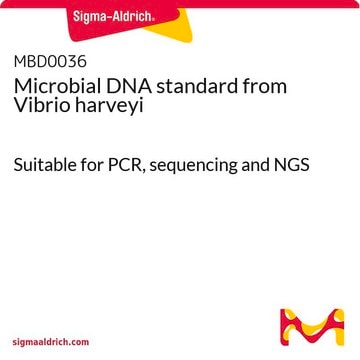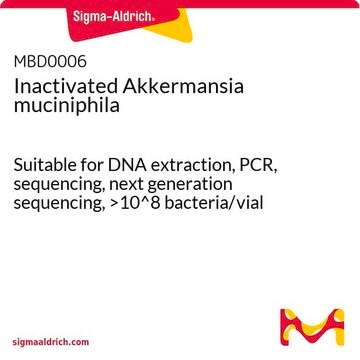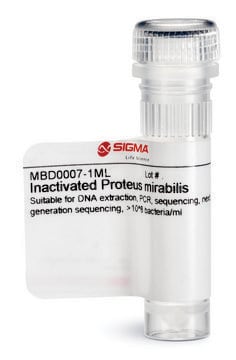MBD0037
Inactivated Vibrio harveyi
Suitable for DNA extraction, PCR, sequencing, next generation sequencing
Sign Into View Organizational & Contract Pricing
All Photos(1)
About This Item
UNSPSC Code:
12352200
NACRES:
NA.51
Recommended Products
Quality Level
form
powder
concentration
>10^8 bacteria/vial
technique(s)
FISH: suitable
shipped in
dry ice
storage temp.
−20°C
General description
Standardization of sample analysis is currently needed in microbiome genomics research workflow. Lack of standardization can lead to biases and errors in common processes during sample preparation and analysis such as sample amplification, sequencing and bioinformatics analyses.1 Vibrio harveyi inactivated cells standard can serve as standard for benchmarking the performance along the workflow of microbiomics or meta-genomics analyses and as a tool to increase reproducibility and allow comparison of results obtained by different labs.
Since V. Harveyi is not a typical resident of the human microbiota it can serve as a spike-in standard in human microbiota genomics workflow analysis.
V. harveyi is a gram negative, rod-shaped, motile, heterotrophic marine luminous pathogen bacterium that widely inhabits natural aquatic environments. It belongs to the family Vibrionaceae of class Gammaproteobacteria 2, known as a serious bacterial pathogen of marine fish and invertebrates, including penaeid shrimp in aquaculture 2,3.
V. harveyi has the ability to regulate gene expression by quorum sensing. Current research 4,5,6 demonstrates 3 regulatory molecules that mediate quorum sensing in in V. harveyi; homoserine lactone (HAI-1), a furanosyl borate diester (AI-2) and cholerae autoinducer 1 (CAI-1). The quorum sensing pathway that regulates bioluminescence, biofilm formation and other virulence factors in V. harveyi is very similar to the pathway that regulates virulence factor expression in Vibrio cholerae, 7, 8 making V. harveyi an important model system for human health research.
Since V. Harveyi is not a typical resident of the human microbiota it can serve as a spike-in standard in human microbiota genomics workflow analysis.
V. harveyi is a gram negative, rod-shaped, motile, heterotrophic marine luminous pathogen bacterium that widely inhabits natural aquatic environments. It belongs to the family Vibrionaceae of class Gammaproteobacteria 2, known as a serious bacterial pathogen of marine fish and invertebrates, including penaeid shrimp in aquaculture 2,3.
V. harveyi has the ability to regulate gene expression by quorum sensing. Current research 4,5,6 demonstrates 3 regulatory molecules that mediate quorum sensing in in V. harveyi; homoserine lactone (HAI-1), a furanosyl borate diester (AI-2) and cholerae autoinducer 1 (CAI-1). The quorum sensing pathway that regulates bioluminescence, biofilm formation and other virulence factors in V. harveyi is very similar to the pathway that regulates virulence factor expression in Vibrio cholerae, 7, 8 making V. harveyi an important model system for human health research.
Application
- Thaw the lyophilized cells at RT for 5 min.
- Use 1 ml of Molecular grade water (cat W4502) to resuspend the lyophilized cells, pipette until all the cells are suspended.
- Transfer the resuspended cells to a clean 1.5ml Eppendorf tube.
- The resuspended bacteria can be used as control and/or spike-in for gDNA extraction from microbiome samples.
Suitable for DNA extraction, PCR, sequencing, next generation sequencing.
Physical form
The inactivated bacteria are provided at >10^8 bacteria/vial as lyophilized powder.
Other Notes
It is recommended to avoid long-term storage of the resuspended cells.
Storage Class
11 - Combustible Solids
wgk_germany
WGK 3
Certificates of Analysis (COA)
Search for Certificates of Analysis (COA) by entering the products Lot/Batch Number. Lot and Batch Numbers can be found on a product’s label following the words ‘Lot’ or ‘Batch’.
Already Own This Product?
Find documentation for the products that you have recently purchased in the Document Library.
Our team of scientists has experience in all areas of research including Life Science, Material Science, Chemical Synthesis, Chromatography, Analytical and many others.
Contact Technical Service








